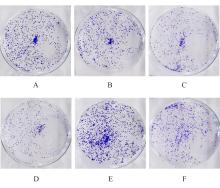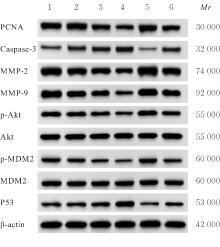吉林大学学报(医学版) ›› 2024, Vol. 50 ›› Issue (6): 1654-1663.doi: 10.13481/j.1671-587X.20240619
• 基础研究 • 上一篇
扶正软坚抗癌方调控Akt/MDM2/P53信号通路对肝癌HepG2细胞恶性生物学行为的影响
娄静1,赵雷1,朱岩洁1,袁帅强1,王菲1,张杭洲1,徐娇娇1,余晓珂2,侯留法1( )
)
- 1.河南省中医药研究院附属医院肝胆脾胃科,河南 郑州 450003
2.河南中医药大学第三附属医院老年病内科,河南 郑州 450003
Effect of Fuzheng Ruanjian Anticancer Formula on malignant biological behaviors of hepatocellulars carcinoma HepG2 cells by regulating Akt/MDM2/P53 signaling pathway
Jing LOU1,Lei ZHAO1,Yanjie ZHU1,Shuaiqiang YUAN1,Fei WANG1,Hangzhou ZHANG1,Jiaojiao XU1,Xiaoke YU2,Liufa HOU1( )
)
- 1.Department of Hepatobiliary Splenogastric,Affiliated Hospital,Henan Provincial Academy of Traditional Chinese Medicine,Zhengzhou 450003,China
2.Department of Geriatrics,Third Affiliated Hospital,Henan University of Traditional Chinese Medicine,Zhengzhou 450003,China
摘要:
目的 探讨扶正软坚抗癌方调控蛋白激酶B(Akt)/鼠双微体2(MDM2)/P53信号通路对肝癌HepG2细胞恶性生物学行为的影响。 方法 采用0、0.05、0.10、0.20、0.40、0.80、1.60、3.20和6.40 g·mL-1扶正软坚抗癌方分别处理HepG2细胞48 h,CCK-8法检测HepG2细胞存活率,筛选扶正软坚抗癌方浓度用于后续实验。将HepG2细胞分为对照组、低剂量扶正软坚抗癌方组(0.2 g·mL-1)、中剂量扶正软坚抗癌方组(0.4 g·mL-1)、高剂量扶正软坚抗癌方组(0.8 g·mL-1)、SC79组(8 mg·L-1 SC79)和高剂量扶正软坚抗癌方+SC79组(0.8 g·mL-1 扶正软坚抗癌方+ 8 mg·L-1 SC79)。CCK-8法检测各组HepG2细胞增殖活性,克隆形成实验检测各组HepG2细胞克隆形成率,流式细胞术检测各组HepG2细胞凋亡率,Transwell小室实验检测各组HepG2细胞迁移和侵袭细胞数,Western blotting法检测各组HepG2细胞中增殖细胞核抗原(PCNA)、含半胱氨酸的天冬氨酸蛋白酶3(Caspase-3)、基质金属蛋白酶(MMP)-2、MMP-9、磷酸化Akt(p-Akt)、磷酸化MDM2(p-MDM2)和P53蛋白表达水平。 结果 随着扶正软坚抗癌方浓度(0、0.05、0.10、0.20、0.40、0.80、1.60、3.20和6.40 g·mL-1)的升高,HepG2细胞存活率逐渐降低(P<0.05),选取0.2、0.4和0.8 g·mL-1 扶正软坚抗癌方用于后续实验。CCK-8法检测,与对照组比较,低、中和高剂量扶正软坚抗癌方组HepG2细胞增殖活性均明显降低(P<0.05),并呈剂量依赖性,SC79组HepG2细胞增殖活性明显升高(P<0.05);与高剂量扶正软坚抗癌方组比较,高剂量扶正软坚抗癌方+SC79组HepG2细胞增殖活性明显升高(P<0.05)。克隆形成实验检测,与对照组比较,低、中和高剂量扶正软坚抗癌方组HepG2细胞克隆形成率均明显降低(P<0.05),并呈剂量依赖性,SC79组HepG2细胞克隆形成率明显升高(P<0.05);与高剂量扶正软坚抗癌方组比较,高剂量扶正软坚抗癌方+SC79组HepG2细胞克隆形成率明显升高(P<0.05)。流式细胞术检测,与对照组比较,低、中和高剂量扶正软坚抗癌方组HepG2细胞凋亡率均明显降低(P<0.05),并呈剂量依赖性,SC79组HepG2细胞凋亡率明显升高(P<0.05);与高剂量扶正软坚抗癌方组比较,高剂量扶正软坚抗癌方+SC79组HepG2细胞凋亡率明显升高(P<0.05)。Transwell小室实验检测,与对照组比较,低、中和高剂量扶正软坚抗癌方组HepG2细胞迁移和侵袭细胞数均明显降低(P<0.05),并呈剂量依赖性,SC79组HepG2细胞迁移和侵袭细胞数均明显升高(P<0.05);与高剂量扶正软坚抗癌方组比较,高剂量扶正软坚抗癌方+SC79组HepG2细胞迁移和侵袭细胞数均明显升高(P<0.05)。Western blotting法检测,与对照组比较,低、中和高剂量扶正软坚抗癌方组HepG2细胞中PCNA、MMP-2、MMP-9、p-Akt和p-MDM2蛋白表达水平均明显降低(P<0.05),并呈剂量依赖性;Caspase-3和P53蛋白表达水平均明显升高(P<0.05),并呈剂量依赖性;SC79组HepG2细胞中PCNA、MMP-2、MMP-9、p-Akt和p-MDM2蛋白表达水平均明显升高(P<0.05),Caspase-3和P53蛋白表达水平均明显降低(P<0.05);与高剂量扶正软坚抗癌方组比较,高剂量扶正软坚抗癌方+SC79组HepG2细胞中PCNA、MMP-2、MMP-9、p-Akt和p-MDM2蛋白表达水平均明显升高(P<0.05),Caspase-3和P53蛋白表达水平均明显降低(P<0.05)。 结论 扶正软坚抗癌方抑制HepG2细胞增殖、迁移和侵袭,促进细胞凋亡,其作用机制与抑制Akt/MDM2信号通路、上调P53蛋白表达有关。
中图分类号:
- R735.7










